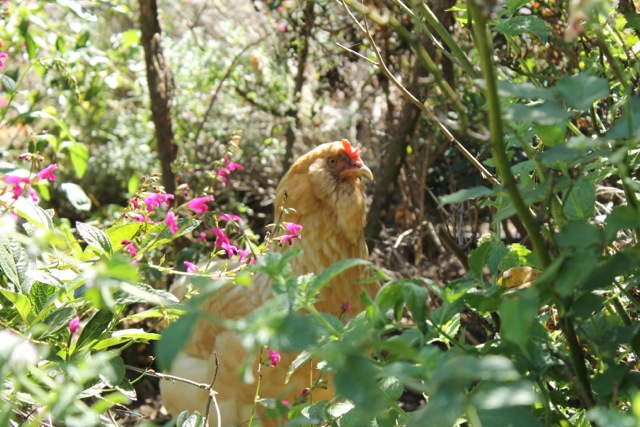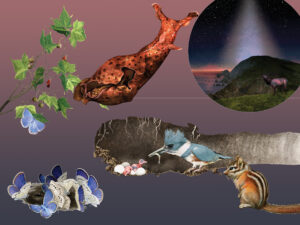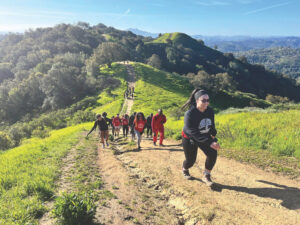Tracy Fasanella, CEO of CarbonCount, Inc., a green accounting firm, lives in two worlds. When she’s not parsing cap-and-trade regulations for clients, pointing them to money for efficiency research, she tends her garden, nurtures her rabbits, and gets both fertilizer and joy from her chickens.
BN: What is your connection with the Bay Area?
Fasanella: I was born in Berkeley, but as a child I spent a lot of time elsewhere. My dad’s business took us all over, but we always ended up in the Bay Area. I studied chemistry at Davis, then later added some courses in economics. In 1986 I earned a BS in polymer chemistry with an economics minor. Then I got married, had two kids, and my life took shape here. It’s home.
Living here also makes sense for my business: California is the world leader in renewal energy financing and funding for companies that are exploring renewables and sustainable technology. The collective consciousness in California is incredibly environmentally aware.

BN How did you enter this field of work?
Fasanella: After college, I started to develop an interest in business. My first job was as a fabric buyer with the clothing designer Jessica McClintock, but I soon became interested in sourcing materials and understanding the details of the budget. In 1990 General Electric hired me to manage their SEC reporting and audits for their partnerships. (Now, I am still trying to work with them because they’re major players in smart grids, wind turbines, and solar panels.)
I loved business: the power that it had to move things and shape things. But I also became interested in gardening and farming at that time. I went to the Smith and Hawken garden shop in Berkeley to hear Paul Hawken speak. He touched on the idea that development, the economy and the environment could work together, versus what business typically did, which was to ignore the environment. His first book, The Ecology of Commerce, really excited me. It’s an amazing treatment of how much potential there is to do things better, in a way that doesn’t harm the planet. Hearing Hawken and studying his book – that was a pivotal moment in my life.
While I was being a mom, I took classes at the UC Berkeley extension. They had classes considering business and environment together. They were starting to touch on the idea of the economic values of sustainability, such as the worth of recycling. This field is still in its infancy: how we assign value to clean air, clean water and a healthy planet. People are starting to be able to quantify the environmental goodness of business.
BN: How do you work?
Fasanella: My goal is to come in at any point in the development of a business, ideally at the beginning, and to help get them set up to take advantage of the tax benefits and favorable financing opportunities for companies that are involved in renewable and sustainable technologies and services. The relevant tax codes are complex and constantly changing. Phase two is to get them set up as carbon offset providers. At this stage, California functions like an auctioneer for carbon credits. I hope someday it will happen more as a free market system.
I also hope the evolution of cap-and-trade will invigorate and inspire a new way of doing business. When the idea of renewable energy takes hold, the impact will be greater than the Industrial Revolution. For example, the Straus Creamery, for whom I’ve done tax work in the past, used to produce an abundance of carbon waste in the form of cow excrement. They have now developed technologies to transform byproducts into usable gas. A huge amount of energy and money has been recovered from that system. And it came about because of lower waste treatment and production costs, along with incentivized federal research on new energy technologies.
BN: What does success look like?
Fasanella. There is this incredible momentum going on. I look at my daughter’s classmates (Wellesley, Class of ’14) and so many are studying the environment. It’s now possible to get an MBA in green management. It’s also a success that California has adopted cap-and-trade. I know that there’s a lot of controversy surrounding it, but I do believe that – at its core – it can get this movement happening.
The main challenge, though, is the time frame within which we need to make change happen. Today’s New York Times reported that by 2100 sea level will rise by four or five feet. Another challenge is the possibility that this movement will stall based on who is in office. Or that people will just be apathetic.
BN: So what role do your garden and your animals play?
Fasanella: My garden and my animals provide a few things: for example, the chickens give us eggs, fertilize the soil, eat bugs, and they’re wonderfully hilarious. If people spent more time outside in the dirt seeing how things grow and animals behave, they would be more compassionate.
BN: What is your favorite outdoor destination in the Bay Area?
Fasanella: The Little Farm at Tilden Regional Park in the Berkeley Hills. It’s so spectacularly beautiful; it smells good; and it’s full of kids out in nature doing all those things that are important, doing farm stuff out in the soil and in the sun. It germinates interest from a super-young age. It’s a place where you can get a real appreciation for nature and what’s at stake.





